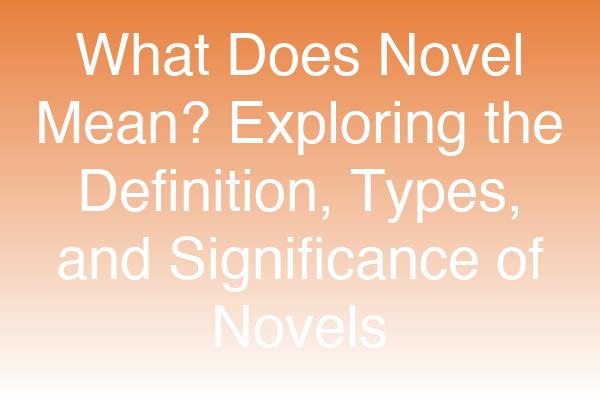
Categories: Literature, Writing, Education
Tags: novel, definition of novel, types of novels, significance of novels, literary terms, storytelling, fiction
What Does Novel Mean? Exploring the Definition, Types, and Significance of Novels
Introduction
When we think of literature, one of the first forms that come to mind is the novel. But what does novel mean? At its core, a novel is more than just a long narrative; it is a complex tapestry of characters, themes, and plots that reflect the human experience. In this blog post, we will delve into the definition of a novel, explore its various types, and discuss its significance in the literary world. Whether you're a budding writer, a literature enthusiast, or simply curious, this guide will provide valuable insights into the world of novels.
Understanding the Definition of a Novel
A novel is a relatively long work of fiction that tells a story through the development of characters and a plot. The term "novel" originates from the Italian word "novella," which means "new." This reflects the form's evolution as a new way of storytelling compared to earlier forms such as epic poetry or short stories.
Key Characteristics of a Novel
- Length: Novels typically exceed 40,000 words, allowing for in-depth character development and complex plots.
- Fictional Narrative: While based on real-life experiences, novels are primarily works of fiction, often exploring themes and ideas through imaginative storytelling.
- Character Development: Novels often feature multiple characters whose arcs evolve throughout the story, providing readers with a deeper emotional connection.
- Plot Structure: A well-structured plot includes exposition, rising action, climax, falling action, and resolution, guiding the reader through the narrative journey.
Types of Novels
Novels can be categorized into various genres, each with its unique characteristics. Here are some of the most popular types of novels:
| Type of Novel | Description |
|---|---|
| Literary Fiction | Focuses on character development and thematic depth rather than plot. |
| Mystery | Revolves around solving a crime or uncovering secrets. |
| Science Fiction | Explores futuristic concepts, advanced technology, and space exploration. |
| Fantasy | Features magical elements and fantastical worlds. |
| Historical Fiction | Set in a specific historical period, blending factual events with fiction. |
| Romance | Centers on romantic relationships and emotional conflicts. |
| Thriller | Engages readers with suspenseful plots and high stakes. |
The Significance of Novels in Literature
Novels hold a significant place in literature for several reasons:
- Cultural Reflection: Novels often reflect the societal norms, values, and issues of their time, providing insight into different cultures and eras.
- Emotional Connection: Through relatable characters and engaging plots, novels evoke a wide range of emotions, allowing readers to connect deeply with the narrative.
- Exploration of Themes: Novels provide a platform for exploring complex themes such as love, loss, identity, and morality, prompting readers to reflect on their own lives.
- Influence on Society: Many novels have sparked social change or influenced public opinion, showcasing the power of storytelling in shaping culture and thought.
Expert Insights on Novels
To further understand the importance of novels, we gathered insights from literary experts:
"A novel is a world unto itself, a place where readers can explore the depths of human experience and imagination." — Dr. Emily Carter, Literary Scholar
"The beauty of a novel lies in its ability to transport us to different times and places, allowing us to live countless lives through its characters." — Prof. James Lee, Author and Critic
Common Questions About Novels
What is the difference between a novel and a short story?
- A novel is a longer narrative that allows for more complex character development and plot, while a short story is a brief narrative focused on a single incident or theme.
Can a novel be based on true events?
- Yes, many novels are inspired by real-life events but are fictionalized for narrative purposes.
What are some famous novels everyone should read?
- Some classics include "Pride and Prejudice" by Jane Austen, "1984" by George Orwell, and "To Kill a Mockingbird" by Harper Lee.
Conclusion
In conclusion, understanding what a novel means goes beyond its definition; it encompasses the rich tapestry of storytelling that reflects our humanity. Novels serve as a mirror to society, a source of entertainment, and a means of exploring complex themes. Whether you are an avid reader or an aspiring writer, embracing the world of novels can enrich your life in countless ways.
Call-to-Action
Are you ready to dive deeper into the world of novels? Explore our recommended reading list and discover your next favorite book today!
Social Media Snippet: What does novel mean? Discover the definition, types, and significance of novels in literature. Dive into the world of storytelling today! #Literature #Novels
Suggested Internal Links:
- The Evolution of Literature: From Oral Traditions to Novels
- Top 10 Must-Read Novels of the 21st Century
- How to Write a Novel: A Step-by-Step Guide
Suggested External Links:
FAQs:
What is a novel?
- A novel is a long work of fiction that tells a story through characters and a plot, typically exceeding 40,000 words.
What are the main genres of novels?
- Common genres include literary fiction, mystery, science fiction, fantasy, historical fiction, romance, and thriller.
Why are novels important?
- Novels reflect culture, evoke emotions, explore themes, and can influence society.
Visual Content Suggestions:
- Infographic: A visual representation of the different types of novels and their characteristics.
- Quote Graphics: Highlighting expert insights on the significance of novels.
- Book Cover Collage: A collection of famous novels to inspire readers.
By following these guidelines, this blog post aims to provide a comprehensive, engaging, and SEO-optimized exploration of what a novel means, appealing to both readers and writers alike.